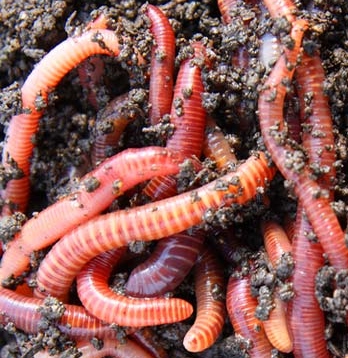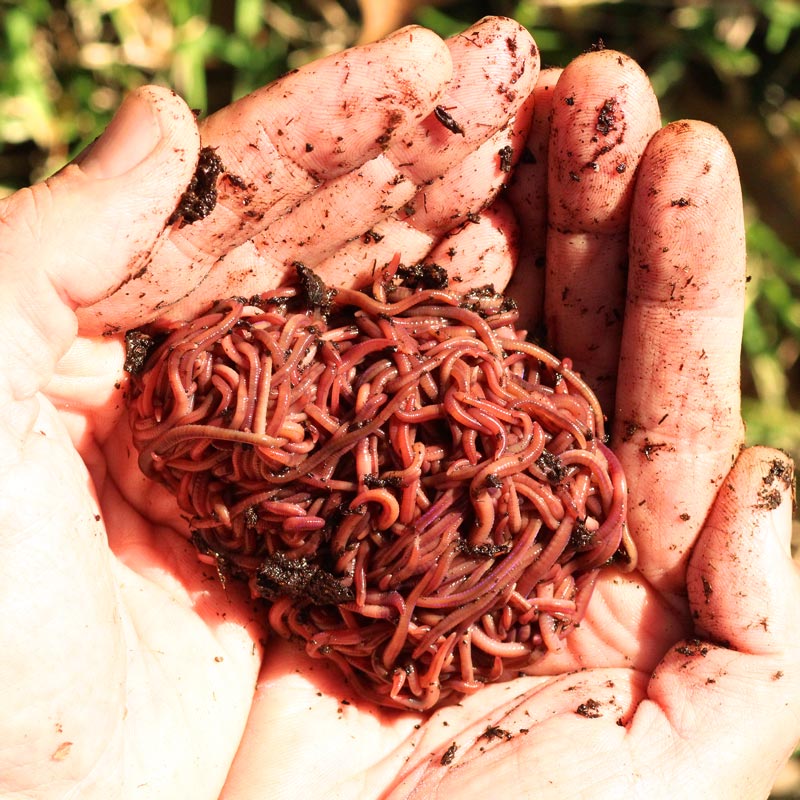Red Wiggler Worms Demystified: Opening the Keys of Vermiculture for Greener Living and Nutrient-Rich Soil
In the realm of lasting techniques for enhancing dirt quality and advertising eco-conscious living, red wiggler worms play an essential yet usually ignored duty. These modest animals have the impressive capability to transform natural waste into nutrient-rich spreadings that act as a potent all-natural fertilizer. By diving into the world of vermiculture, one can reveal a wide variety of benefits that expand much past standard composting techniques. Recognizing the details of looking after these worms, enhancing their atmosphere, and using their castings can lead to a greener lifestyle and healthier dirt for plants to grow.
The Role of Red Wiggler Worms
Red Wiggler worms play an essential role in composting systems by effectively damaging down natural issue right into nutrient-rich castings. These starved eaters consume a selection of natural materials, such as cooking area scraps, backyard waste, and paper items. As they feed, the worms' gastrointestinal procedures damage down the natural matter into a fine, dark, and nutrient-dense material referred to as worm spreadings or vermicompost.
The spreadings produced by Red Wiggler worms are very advantageous for dirt health and plant growth. They are abundant in necessary nutrients like potassium, phosphorus, and nitrogen, which are important for sustaining healthy and balanced plant advancement. Furthermore, worm castings include advantageous germs and enzymes that assist improve dirt structure, increase water retention, and improve nutrient uptake by plants.
Benefits of Vermicomposting

Furthermore, vermicompost, the nutrient-rich output of vermicomposting, acts as an outstanding organic plant food and dirt conditioner. It enhances soil framework, enhances soil oygenation, and raises dirt dampness retention. These residential properties add to healthier plants with more powerful root systems and better resistance to conditions and insects. Vermicompost additionally improves the soil with necessary nutrients like phosphorus, potassium, and nitrogen, advertising plant growth and general soil fertility.
In addition, vermicomposting assistances lasting gardening methods by providing a chemical-free and natural choice to artificial plant foods. Red Wiggler Worms. This eco-friendly method not only enriches the soil however additionally helps in reducing dependence on damaging chemicals, promoting a Going Here greener and extra sustainable means of horticulture
Establishing a Worm Container
When developing a worm container for vermicomposting, proper configuration is vital to make certain the success of the composting process. The first action in establishing up a worm container is choosing a suitable container.
After including the bed linen, present the red wiggler worms to the bin. The worms ought to after that be given with food scraps such as fruit and vegetable peels, coffee grounds, and eggshells.
On a regular basis keep track of the dampness levels and temperature in the worm bin to ensure optimal problems for the worms. With appropriate arrangement and upkeep, the worm container will efficiently convert directory natural waste into nutrient-rich garden compost for your plants and garden.
Harvesting Worm Spreadings
To successfully accumulate nutrient-rich worm spreadings from your vermicomposting system, an organized harvesting technique is crucial. When it comes time to gather the worm spreadings, there are a couple of crucial actions to follow to ensure a successful process. Quit including fresh food scraps to one side of the worm container for a couple of weeks prior to collecting. This motivates the worms to move sideways with fresh bedding and food, making it less complicated to scoop out the spreadings from the other side.

Troubleshooting Common Issues
Recognizing and dealing with usual difficulties that might occur during the vermicomposting procedure is essential for maintaining a effective and healthy and balanced worm bin. Including excess food scraps can lead to an accumulation of wetness and level of acidity in the worm container, possibly damaging the worms. Another problem is unpleasant odors originating from the worm bin.
Additionally, if the worm population is declining or the worms show up harmful, maybe because of environmental stress factors such as severe temperature levels or pH levels. Keeping track of these factors and making required modifications is essential for the wellness of the worms. By troubleshooting these usual issues quickly, vermicomposters can make certain a effective and smooth vermicomposting process while preserving a flourishing worm population.

Verdict
In final thought, red wiggler worms play an important function in vermiculture by breaking down natural issue right into nutrient-rich soil. find out here now Establishing up a worm container is crucial for effective vermiculture, and gathering worm castings offers beneficial compost for gardening.
As they feed, the worms' gastrointestinal processes break down the natural issue into a penalty, dark, and nutrient-dense material understood as worm spreadings or vermicompost.
The castings produced by Red Wiggler worms are highly helpful for soil wellness and plant development. Including excess food scraps can lead to a build-up of wetness and level of acidity in the worm container, potentially harming the worms.Furthermore, if the worm populace is declining or the worms appear harmful, it could be due to ecological stressors such as severe temperatures or pH degrees. Setting up a worm bin is essential for effective vermiculture, and collecting worm spreadings offers important compost for gardening.